Pic story: post-90s man promotes traditional Chinese aulic handicraft
 0 Comment(s)
0 Comment(s) Print
Print E-mail Xinhua, June 13, 2022
E-mail Xinhua, June 13, 2022
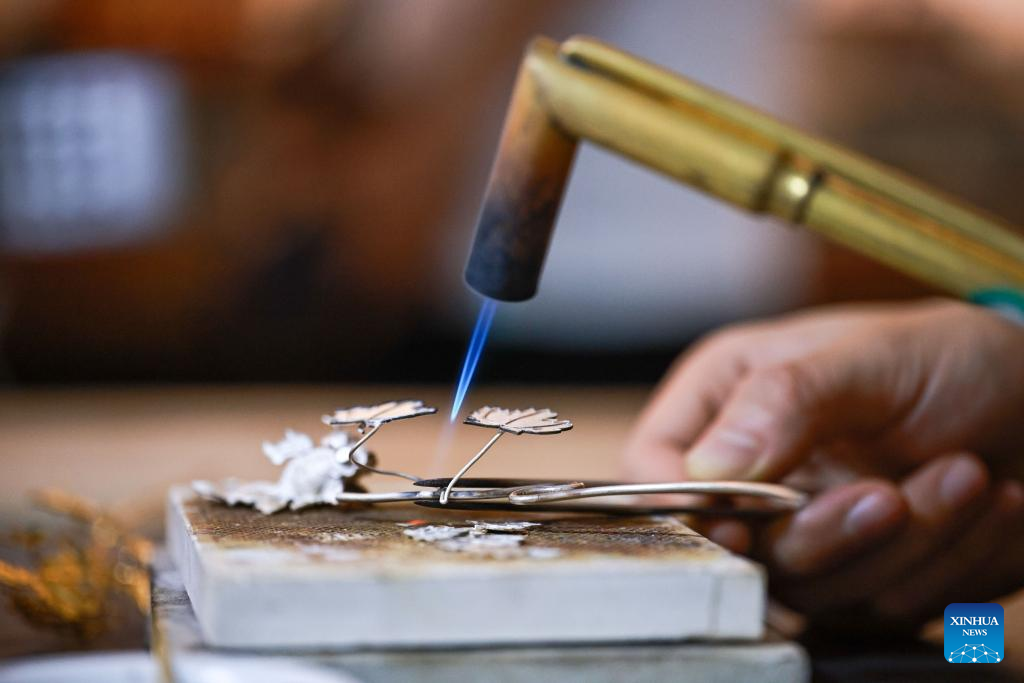
Gu Guoqiang makes a filigree mosaic artwork in southwest China's Chongqing, June 9, 2022. Filigree Mosaic craft, a traditional Chinese aulic handicraft dating back to the Spring and Autumn Period (770-476BC), uses metal such as gold and silver to fold artwork inlaid with gemstone or pearl. It is also called fine gold craft as it usually uses spun gold as thin as 0.16 millimeters to form various shapes, and was listed as one of China's national intangible cultural heritages in 2008.
Gu Guoqiang, born in 1994, fell in love with the craft seven years ago during his study in Beijing for restoration of cultural relics. Fascinated by a filigree mosaic work of his master, he returned to his hometown Chongqing and took provincial-level master of arts and crafts Li Changyi as his new master. In 2007, Gu Guoqiang set up his own studio, exploring a way to make filigree mosaic accessories fitting for modern people. He tries to absorb traditional Chinese culture concepts in his designs, and also takes into account modern taste and use habits.
In order to promote the craft, he shares his works through various platforms and is now followed by 300,000 fans on the popular smartphone app Kuaishou. Some followers even come to Chongqing to learn this craft from him.
Nowadays, Gu's studio sells about 300 filigree mosaic artworks per month, many of which are ordered by people overseas. "Most people try to catch other's eyes by intricate works, however some take craftsmanship as life art," said Gu Guoqiang. He makes his own way in inheriting the ancient art, which is common now in China as more youngsters who love traditional culture and arts are willing to pass down the intangible cultural heritages and create a new future for them. (Xinhua/Tang Yi)
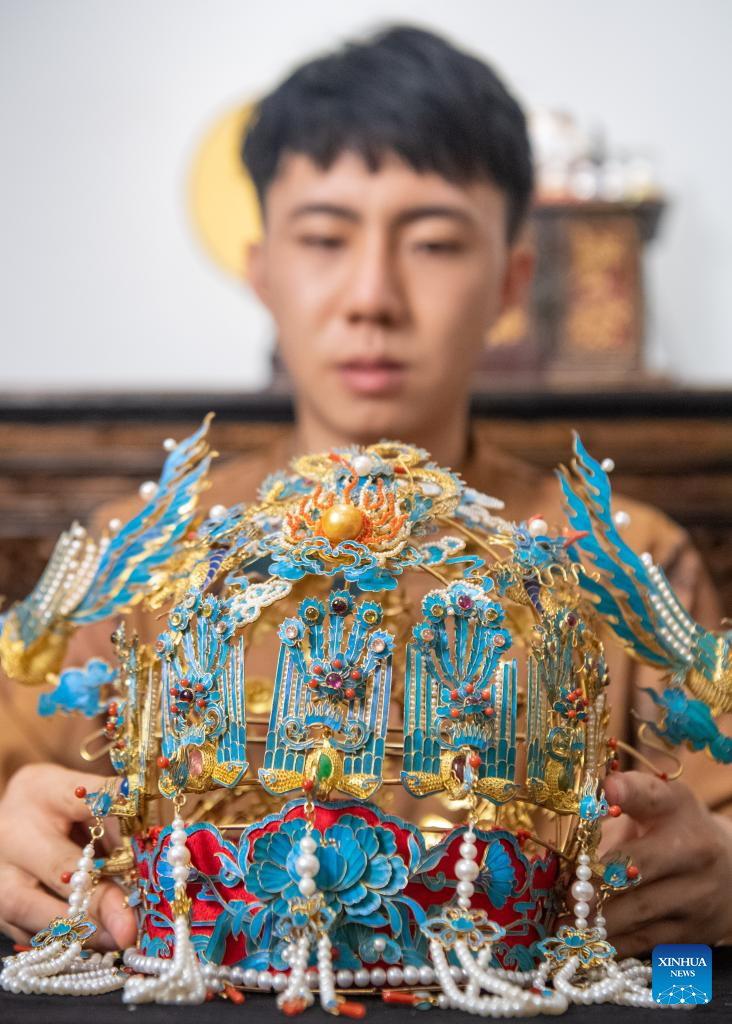
Gu Guoqiang shows a filigree mosaic artwork in southwest China's Chongqing, June 9, 2022. Filigree Mosaic craft, a traditional Chinese aulic handicraft dating back to the Spring and Autumn Period (770-476BC), uses metal such as gold and silver to fold artwork inlaid with gemstone or pearl. It is also called fine gold craft as it usually uses spun gold as thin as 0.16 millimeters to form various shapes, and was listed as one of China's national intangible cultural heritages in 2008.
Gu Guoqiang, born in 1994, fell in love with the craft seven years ago during his study in Beijing for restoration of cultural relics. Fascinated by a filigree mosaic work of his master, he returned to his hometown Chongqing and took provincial-level master of arts and crafts Li Changyi as his new master. In 2007, Gu Guoqiang set up his own studio, exploring a way to make filigree mosaic accessories fitting for modern people. He tries to absorb traditional Chinese culture concepts in his designs, and also takes into account modern taste and use habits.
In order to promote the craft, he shares his works through various platforms and is now followed by 300,000 fans on the popular smartphone app Kuaishou. Some followers even come to Chongqing to learn this craft from him.
Nowadays, Gu's studio sells about 300 filigree mosaic artworks per month, many of which are ordered by people overseas. "Most people try to catch other's eyes by intricate works, however some take craftsmanship as life art," said Gu Guoqiang. He makes his own way in inheriting the ancient art, which is common now in China as more youngsters who love traditional culture and arts are willing to pass down the intangible cultural heritages and create a new future for them. (Xinhua/Tang Yi)
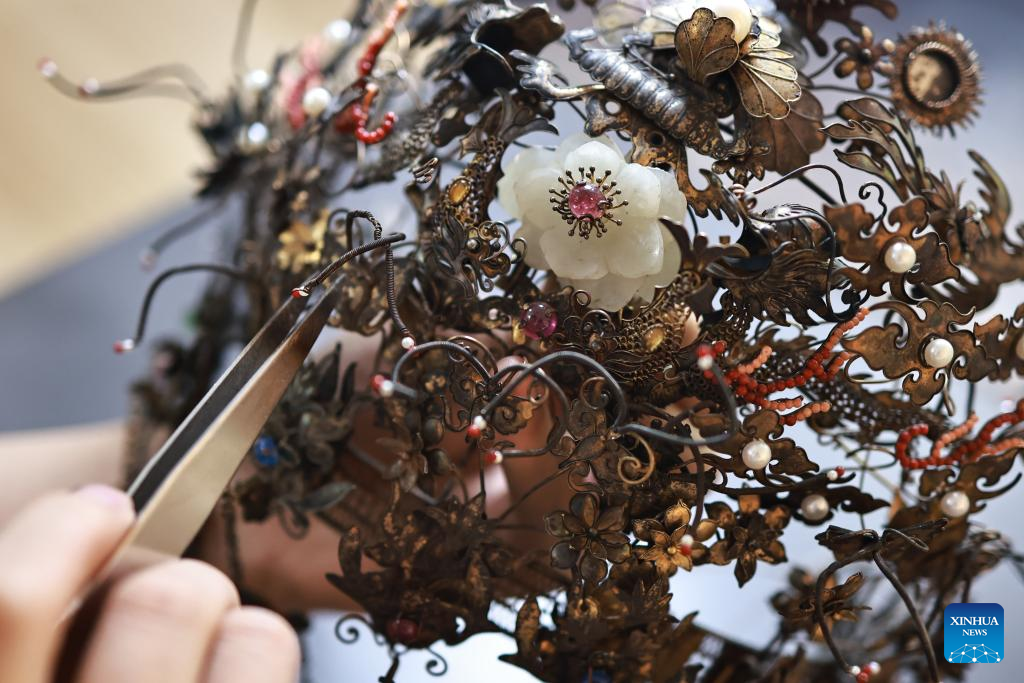
Gu Guoqiang makes a filigree mosaic artwork in southwest China's Chongqing, April 20, 2022. Filigree Mosaic craft, a traditional Chinese aulic handicraft dating back to the Spring and Autumn Period (770-476BC), uses metal such as gold and silver to fold artwork inlaid with gemstone or pearl. It is also called fine gold craft as it usually uses spun gold as thin as 0.16 millimeters to form various shapes, and was listed as one of China's national intangible cultural heritages in 2008.
Gu Guoqiang, born in 1994, fell in love with the craft seven years ago during his study in Beijing for restoration of cultural relics. Fascinated by a filigree mosaic work of his master, he returned to his hometown Chongqing and took provincial-level master of arts and crafts Li Changyi as his new master. In 2007, Gu Guoqiang set up his own studio, exploring a way to make filigree mosaic accessories fitting for modern people. He tries to absorb traditional Chinese culture concepts in his designs, and also takes into account modern taste and use habits.
In order to promote the craft, he shares his works through various platforms and is now followed by 300,000 fans on the popular smartphone app Kuaishou. Some followers even come to Chongqing to learn this craft from him.
Nowadays, Gu's studio sells about 300 filigree mosaic artworks per month, many of which are ordered by people overseas. "Most people try to catch other's eyes by intricate works, however some take craftsmanship as life art," said Gu Guoqiang. He makes his own way in inheriting the ancient art, which is common now in China as more youngsters who love traditional culture and arts are willing to pass down the intangible cultural heritages and create a new future for them. (Photo by Su Zhigang/Xinhua)
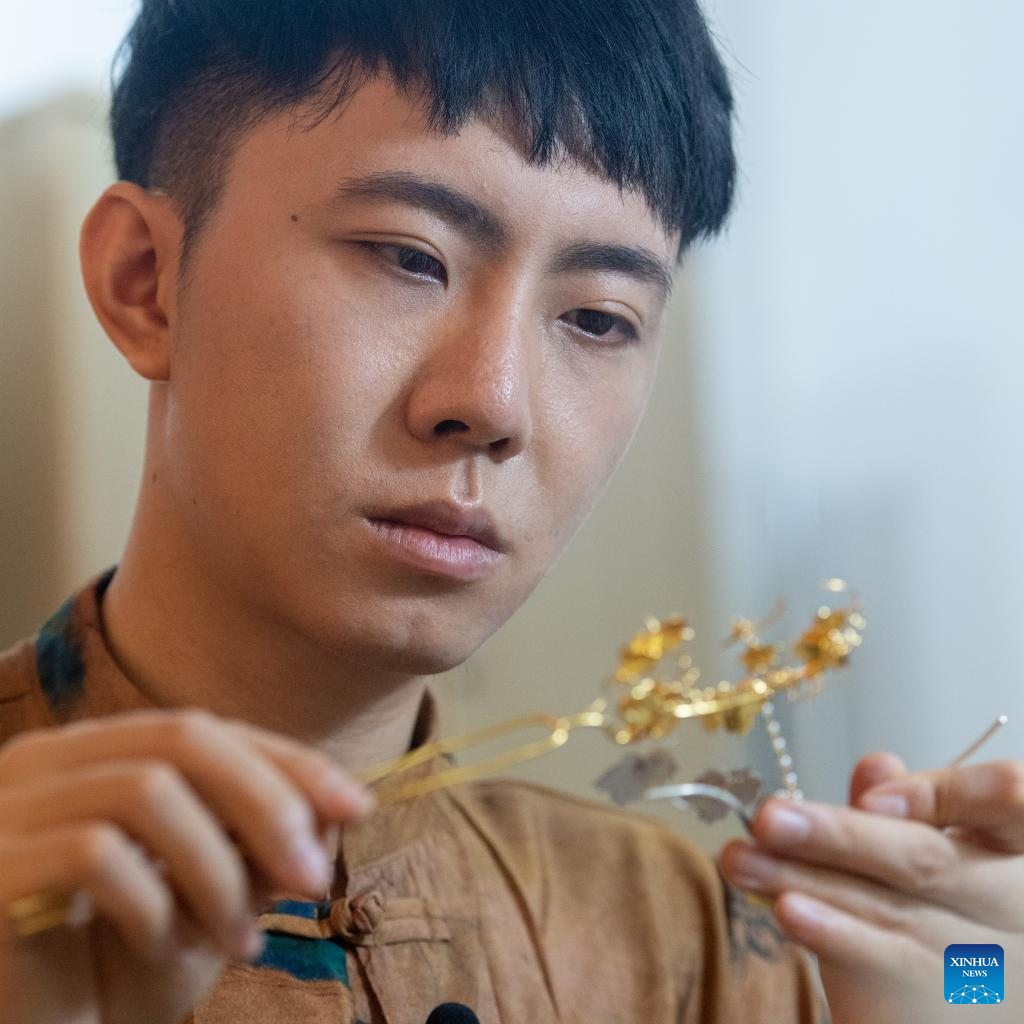
Gu Guoqiang makes a filigree mosaic artwork in southwest China's Chongqing, June 9, 2022. Filigree Mosaic craft, a traditional Chinese aulic handicraft dating back to the Spring and Autumn Period (770-476BC), uses metal such as gold and silver to fold artwork inlaid with gemstone or pearl. It is also called fine gold craft as it usually uses spun gold as thin as 0.16 millimeters to form various shapes, and was listed as one of China's national intangible cultural heritages in 2008.
Gu Guoqiang, born in 1994, fell in love with the craft seven years ago during his study in Beijing for restoration of cultural relics. Fascinated by a filigree mosaic work of his master, he returned to his hometown Chongqing and took provincial-level master of arts and crafts Li Changyi as his new master. In 2007, Gu Guoqiang set up his own studio, exploring a way to make filigree mosaic accessories fitting for modern people. He tries to absorb traditional Chinese culture concepts in his designs, and also takes into account modern taste and use habits.
In order to promote the craft, he shares his works through various platforms and is now followed by 300,000 fans on the popular smartphone app Kuaishou. Some followers even come to Chongqing to learn this craft from him.
Nowadays, Gu's studio sells about 300 filigree mosaic artworks per month, many of which are ordered by people overseas. "Most people try to catch other's eyes by intricate works, however some take craftsmanship as life art," said Gu Guoqiang. He makes his own way in inheriting the ancient art, which is common now in China as more youngsters who love traditional culture and arts are willing to pass down the intangible cultural heritages and create a new future for them. (Xinhua/Tang Yi)
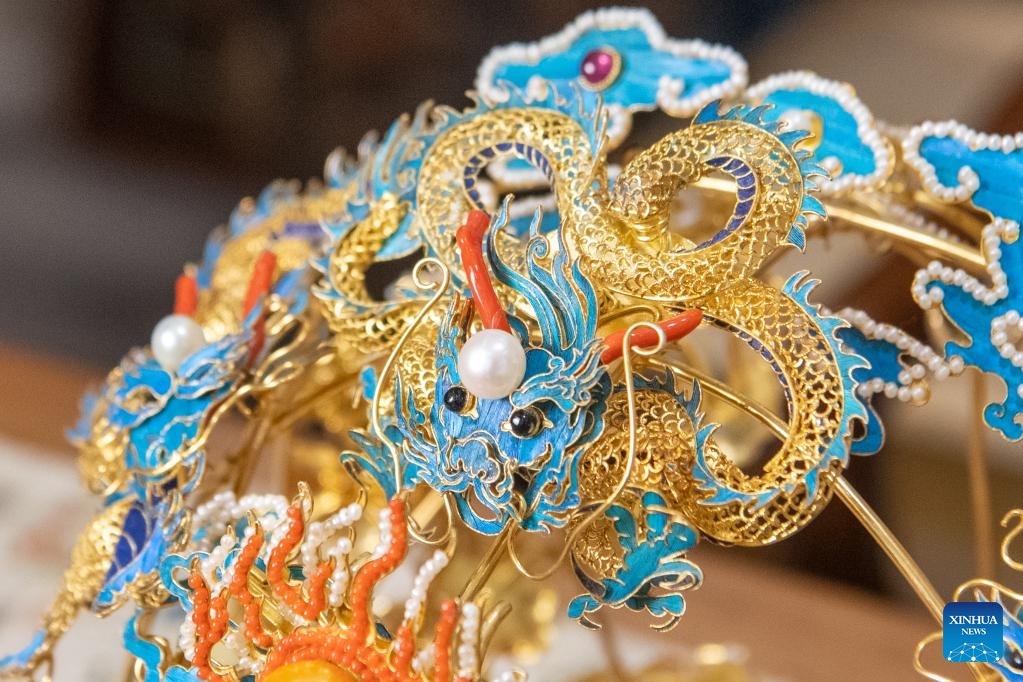
Photo shows a filigree mosaic artwork made by Gu Guoqiang in southwest China's Chongqing, June 9, 2022. Filigree Mosaic craft, a traditional Chinese aulic handicraft dating back to the Spring and Autumn Period (770-476BC), uses metal such as gold and silver to fold artwork inlaid with gemstone or pearl. It is also called fine gold craft as it usually uses spun gold as thin as 0.16 millimeters to form various shapes, and was listed as one of China's national intangible cultural heritages in 2008.
Gu Guoqiang, born in 1994, fell in love with the craft seven years ago during his study in Beijing for restoration of cultural relics. Fascinated by a filigree mosaic work of his master, he returned to his hometown Chongqing and took provincial-level master of arts and crafts Li Changyi as his new master. In 2007, Gu Guoqiang set up his own studio, exploring a way to make filigree mosaic accessories fitting for modern people. He tries to absorb traditional Chinese culture concepts in his designs, and also takes into account modern taste and use habits.
In order to promote the craft, he shares his works through various platforms and is now followed by 300,000 fans on the popular smartphone app Kuaishou. Some followers even come to Chongqing to learn this craft from him.
Nowadays, Gu's studio sells about 300 filigree mosaic artworks per month, many of which are ordered by people overseas. "Most people try to catch other's eyes by intricate works, however some take craftsmanship as life art," said Gu Guoqiang. He makes his own way in inheriting the ancient art, which is common now in China as more youngsters who love traditional culture and arts are willing to pass down the intangible cultural heritages and create a new future for them. (Xinhua/Tang Yi)
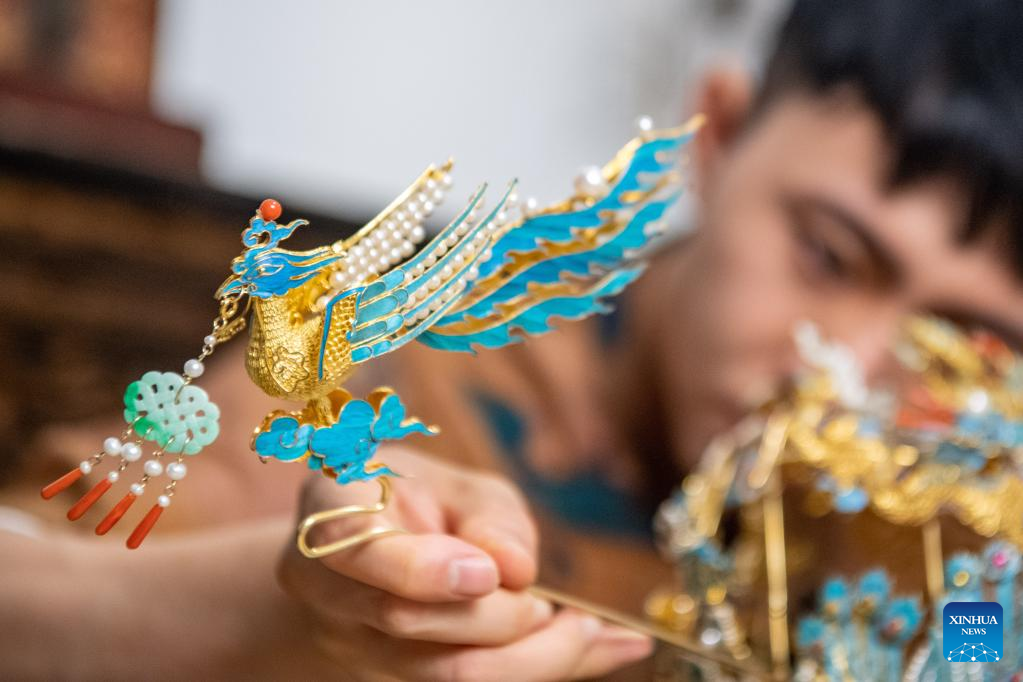
Gu Guoqiang makes a filigree mosaic artwork in southwest China's Chongqing, June 9, 2022. Filigree Mosaic craft, a traditional Chinese aulic handicraft dating back to the Spring and Autumn Period (770-476BC), uses metal such as gold and silver to fold artwork inlaid with gemstone or pearl. It is also called fine gold craft as it usually uses spun gold as thin as 0.16 millimeters to form various shapes, and was listed as one of China's national intangible cultural heritages in 2008.
Gu Guoqiang, born in 1994, fell in love with the craft seven years ago during his study in Beijing for restoration of cultural relics. Fascinated by a filigree mosaic work of his master, he returned to his hometown Chongqing and took provincial-level master of arts and crafts Li Changyi as his new master. In 2007, Gu Guoqiang set up his own studio, exploring a way to make filigree mosaic accessories fitting for modern people. He tries to absorb traditional Chinese culture concepts in his designs, and also takes into account modern taste and use habits.
In order to promote the craft, he shares his works through various platforms and is now followed by 300,000 fans on the popular smartphone app Kuaishou. Some followers even come to Chongqing to learn this craft from him.
Nowadays, Gu's studio sells about 300 filigree mosaic artworks per month, many of which are ordered by people overseas. "Most people try to catch other's eyes by intricate works, however some take craftsmanship as life art," said Gu Guoqiang. He makes his own way in inheriting the ancient art, which is common now in China as more youngsters who love traditional culture and arts are willing to pass down the intangible cultural heritages and create a new future for them. (Xinhua/Tang Yi)
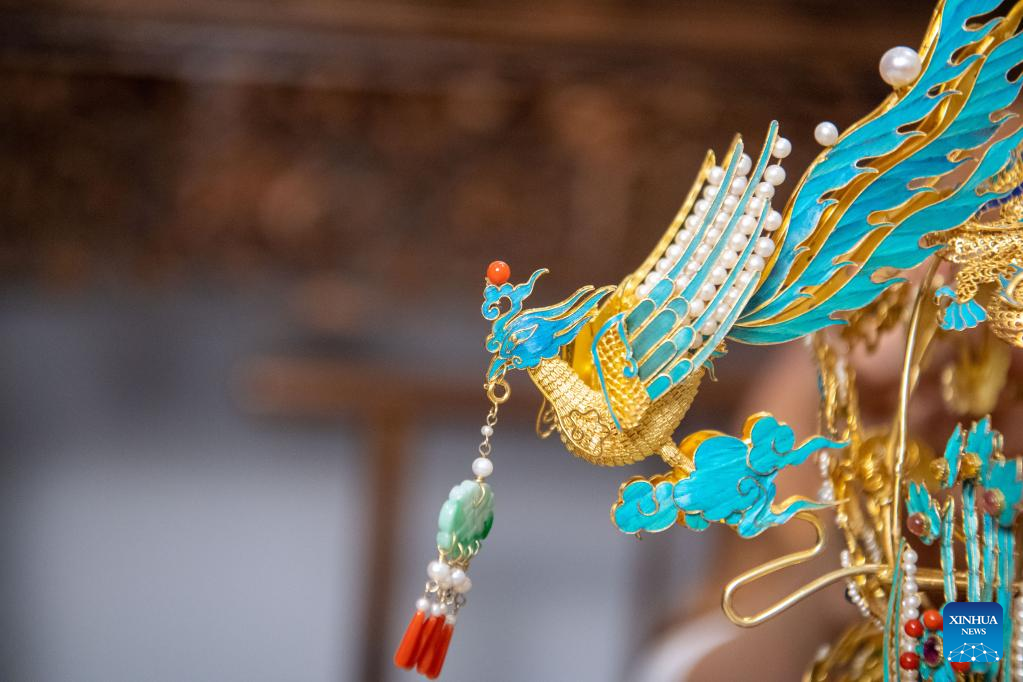
Photo shows a filigree mosaic artwork made by Gu Guoqiang in southwest China's Chongqing, June 9, 2022. Filigree Mosaic craft, a traditional Chinese aulic handicraft dating back to the Spring and Autumn Period (770-476BC), uses metal such as gold and silver to fold artwork inlaid with gemstone or pearl. It is also called fine gold craft as it usually uses spun gold as thin as 0.16 millimeters to form various shapes, and was listed as one of China's national intangible cultural heritages in 2008.
Gu Guoqiang, born in 1994, fell in love with the craft seven years ago during his study in Beijing for restoration of cultural relics. Fascinated by a filigree mosaic work of his master, he returned to his hometown Chongqing and took provincial-level master of arts and crafts Li Changyi as his new master. In 2007, Gu Guoqiang set up his own studio, exploring a way to make filigree mosaic accessories fitting for modern people. He tries to absorb traditional Chinese culture concepts in his designs, and also takes into account modern taste and use habits.
In order to promote the craft, he shares his works through various platforms and is now followed by 300,000 fans on the popular smartphone app Kuaishou. Some followers even come to Chongqing to learn this craft from him.
Nowadays, Gu's studio sells about 300 filigree mosaic artworks per month, many of which are ordered by people overseas. "Most people try to catch other's eyes by intricate works, however some take craftsmanship as life art," said Gu Guoqiang. He makes his own way in inheriting the ancient art, which is common now in China as more youngsters who love traditional culture and arts are willing to pass down the intangible cultural heritages and create a new future for them. (Xinhua/Tang Yi)
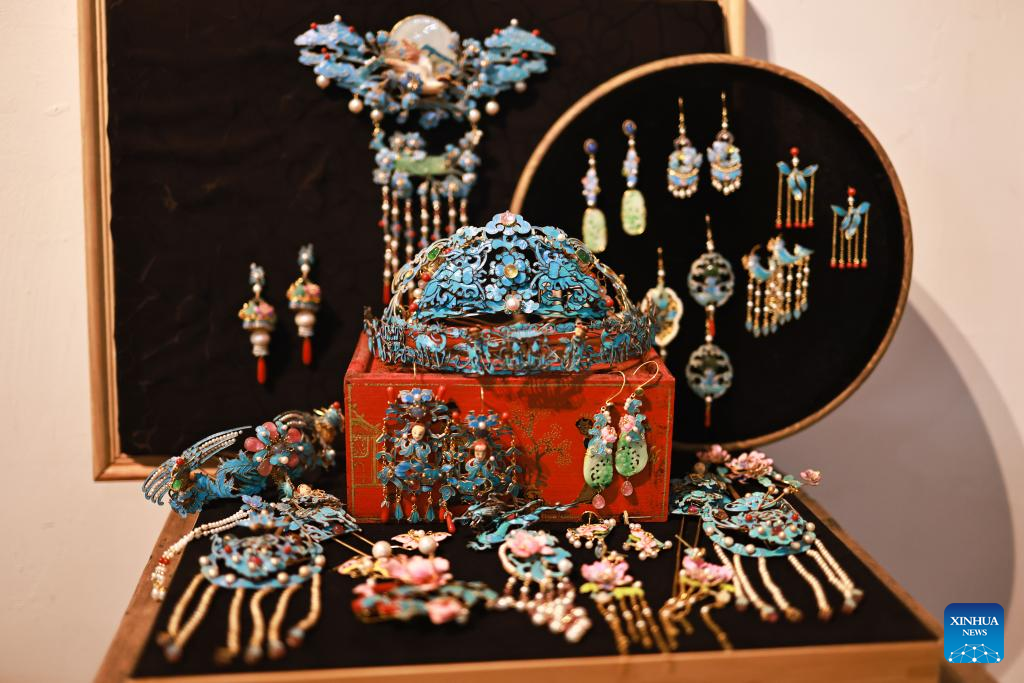
Photo shows filigree mosaic artworks made by Gu Guoqiang in southwest China's Chongqing, April 20, 2022. Filigree Mosaic craft, a traditional Chinese aulic handicraft dating back to the Spring and Autumn Period (770-476BC), uses metal such as gold and silver to fold artwork inlaid with gemstone or pearl. It is also called fine gold craft as it usually uses spun gold as thin as 0.16 millimeters to form various shapes, and was listed as one of China's national intangible cultural heritages in 2008.
Gu Guoqiang, born in 1994, fell in love with the craft seven years ago during his study in Beijing for restoration of cultural relics. Fascinated by a filigree mosaic work of his master, he returned to his hometown Chongqing and took provincial-level master of arts and crafts Li Changyi as his new master. In 2007, Gu Guoqiang set up his own studio, exploring a way to make filigree mosaic accessories fitting for modern people. He tries to absorb traditional Chinese culture concepts in his designs, and also takes into account modern taste and use habits.
In order to promote the craft, he shares his works through various platforms and is now followed by 300,000 fans on the popular smartphone app Kuaishou. Some followers even come to Chongqing to learn this craft from him.
Nowadays, Gu's studio sells about 300 filigree mosaic artworks per month, many of which are ordered by people overseas. "Most people try to catch other's eyes by intricate works, however some take craftsmanship as life art," said Gu Guoqiang. He makes his own way in inheriting the ancient art, which is common now in China as more youngsters who love traditional culture and arts are willing to pass down the intangible cultural heritages and create a new future for them. (Photo by Su Zhigang/Xinhua)
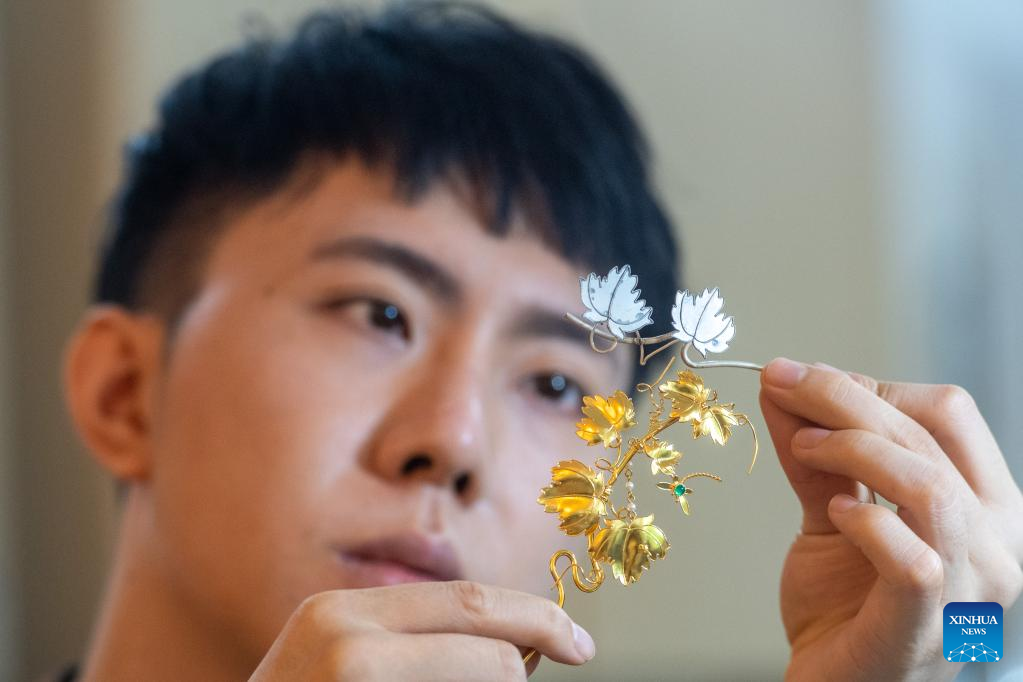
Gu Guoqiang makes a filigree mosaic artwork in southwest China's Chongqing, June 9, 2022. Filigree Mosaic craft, a traditional Chinese aulic handicraft dating back to the Spring and Autumn Period (770-476BC), uses metal such as gold and silver to fold artwork inlaid with gemstone or pearl. It is also called fine gold craft as it usually uses spun gold as thin as 0.16 millimeters to form various shapes, and was listed as one of China's national intangible cultural heritages in 2008.
Gu Guoqiang, born in 1994, fell in love with the craft seven years ago during his study in Beijing for restoration of cultural relics. Fascinated by a filigree mosaic work of his master, he returned to his hometown Chongqing and took provincial-level master of arts and crafts Li Changyi as his new master. In 2007, Gu Guoqiang set up his own studio, exploring a way to make filigree mosaic accessories fitting for modern people. He tries to absorb traditional Chinese culture concepts in his designs, and also takes into account modern taste and use habits.
In order to promote the craft, he shares his works through various platforms and is now followed by 300,000 fans on the popular smartphone app Kuaishou. Some followers even come to Chongqing to learn this craft from him.
Nowadays, Gu's studio sells about 300 filigree mosaic artworks per month, many of which are ordered by people overseas. "Most people try to catch other's eyes by intricate works, however some take craftsmanship as life art," said Gu Guoqiang. He makes his own way in inheriting the ancient art, which is common now in China as more youngsters who love traditional culture and arts are willing to pass down the intangible cultural heritages and create a new future for them. (Xinhua/Tang Yi)
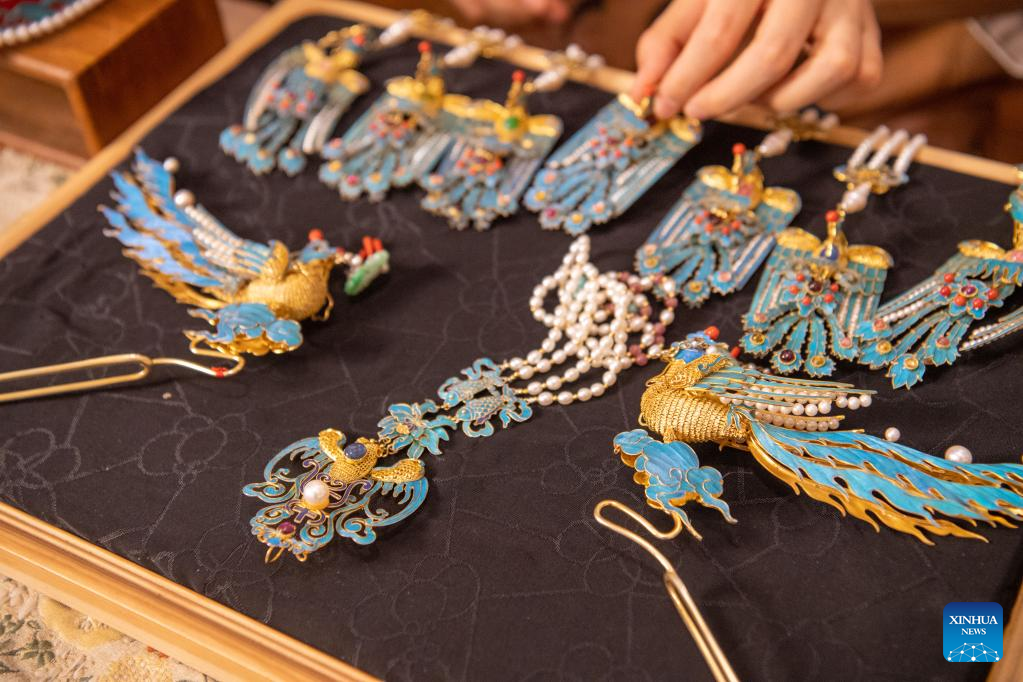
Gu Guoqiang shows filigree mosaic artworks in southwest China's Chongqing, June 9, 2022. Filigree Mosaic craft, a traditional Chinese aulic handicraft dating back to the Spring and Autumn Period (770-476BC), uses metal such as gold and silver to fold artwork inlaid with gemstone or pearl. It is also called fine gold craft as it usually uses spun gold as thin as 0.16 millimeters to form various shapes, and was listed as one of China's national intangible cultural heritages in 2008.
Gu Guoqiang, born in 1994, fell in love with the craft seven years ago during his study in Beijing for restoration of cultural relics. Fascinated by a filigree mosaic work of his master, he returned to his hometown Chongqing and took provincial-level master of arts and crafts Li Changyi as his new master. In 2007, Gu Guoqiang set up his own studio, exploring a way to make filigree mosaic accessories fitting for modern people. He tries to absorb traditional Chinese culture concepts in his designs, and also takes into account modern taste and use habits.
In order to promote the craft, he shares his works through various platforms and is now followed by 300,000 fans on the popular smartphone app Kuaishou. Some followers even come to Chongqing to learn this craft from him.
Nowadays, Gu's studio sells about 300 filigree mosaic artworks per month, many of which are ordered by people overseas. "Most people try to catch other's eyes by intricate works, however some take craftsmanship as life art," said Gu Guoqiang. He makes his own way in inheriting the ancient art, which is common now in China as more youngsters who love traditional culture and arts are willing to pass down the intangible cultural heritages and create a new future for them. (Xinhua/Tang Yi)
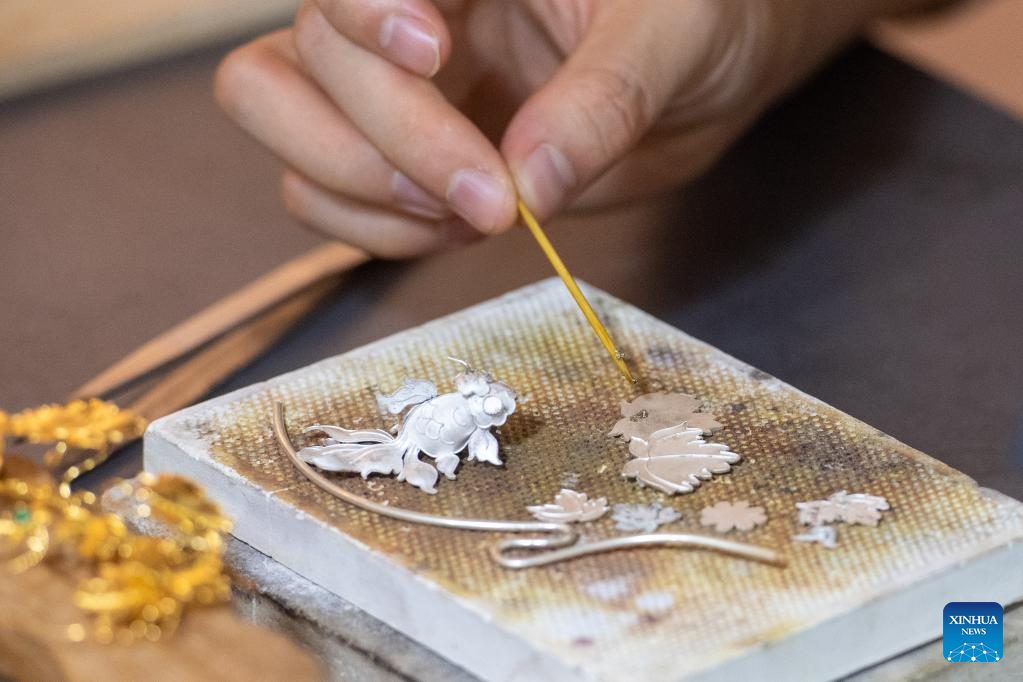
Gu Guoqiang makes a filigree mosaic artwork in southwest China's Chongqing, June 9, 2022. Filigree Mosaic craft, a traditional Chinese aulic handicraft dating back to the Spring and Autumn Period (770-476BC), uses metal such as gold and silver to fold artwork inlaid with gemstone or pearl. It is also called fine gold craft as it usually uses spun gold as thin as 0.16 millimeters to form various shapes, and was listed as one of China's national intangible cultural heritages in 2008.
Gu Guoqiang, born in 1994, fell in love with the craft seven years ago during his study in Beijing for restoration of cultural relics. Fascinated by a filigree mosaic work of his master, he returned to his hometown Chongqing and took provincial-level master of arts and crafts Li Changyi as his new master. In 2007, Gu Guoqiang set up his own studio, exploring a way to make filigree mosaic accessories fitting for modern people. He tries to absorb traditional Chinese culture concepts in his designs, and also takes into account modern taste and use habits.
In order to promote the craft, he shares his works through various platforms and is now followed by 300,000 fans on the popular smartphone app Kuaishou. Some followers even come to Chongqing to learn this craft from him.
Nowadays, Gu's studio sells about 300 filigree mosaic artworks per month, many of which are ordered by people overseas. "Most people try to catch other's eyes by intricate works, however some take craftsmanship as life art," said Gu Guoqiang. He makes his own way in inheriting the ancient art, which is common now in China as more youngsters who love traditional culture and arts are willing to pass down the intangible cultural heritages and create a new future for them. (Xinhua/Tang Yi)
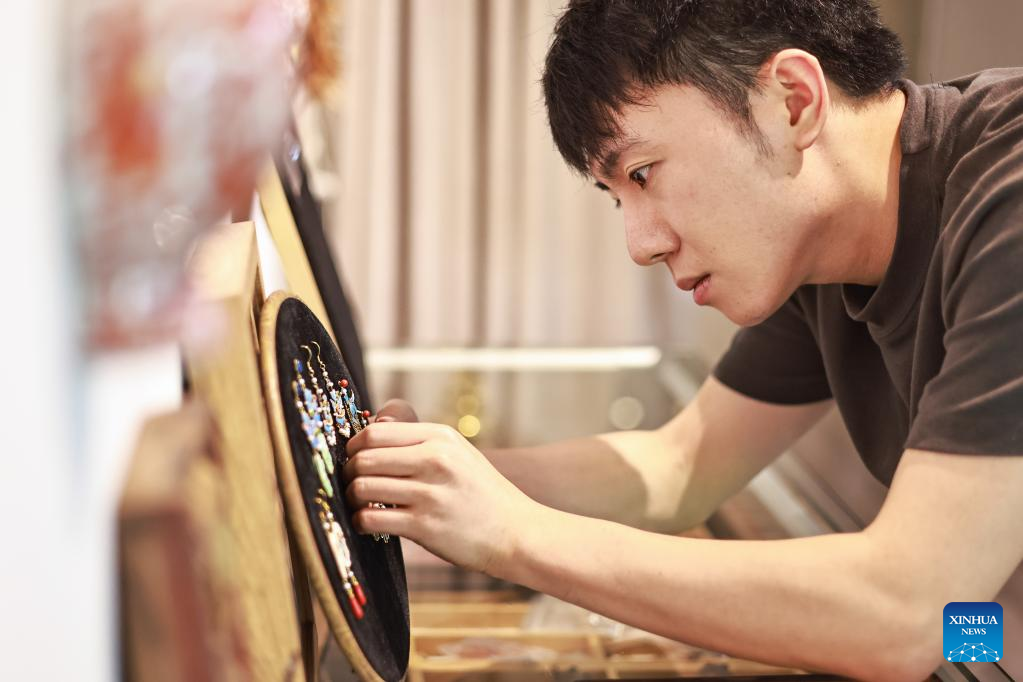
Gu Guoqiang makes a filigree mosaic artwork in southwest China's Chongqing, April 20, 2022. Filigree Mosaic craft, a traditional Chinese aulic handicraft dating back to the Spring and Autumn Period (770-476BC), uses metal such as gold and silver to fold artwork inlaid with gemstone or pearl. It is also called fine gold craft as it usually uses spun gold as thin as 0.16 millimeters to form various shapes, and was listed as one of China's national intangible cultural heritages in 2008.
Gu Guoqiang, born in 1994, fell in love with the craft seven years ago during his study in Beijing for restoration of cultural relics. Fascinated by a filigree mosaic work of his master, he returned to his hometown Chongqing and took provincial-level master of arts and crafts Li Changyi as his new master. In 2007, Gu Guoqiang set up his own studio, exploring a way to make filigree mosaic accessories fitting for modern people. He tries to absorb traditional Chinese culture concepts in his designs, and also takes into account modern taste and use habits.
In order to promote the craft, he shares his works through various platforms and is now followed by 300,000 fans on the popular smartphone app Kuaishou. Some followers even come to Chongqing to learn this craft from him.
Nowadays, Gu's studio sells about 300 filigree mosaic artworks per month, many of which are ordered by people overseas. "Most people try to catch other's eyes by intricate works, however some take craftsmanship as life art," said Gu Guoqiang. He makes his own way in inheriting the ancient art, which is common now in China as more youngsters who love traditional culture and arts are willing to pass down the intangible cultural heritages and create a new future for them. (Photo by Su Zhigang/Xinhua)
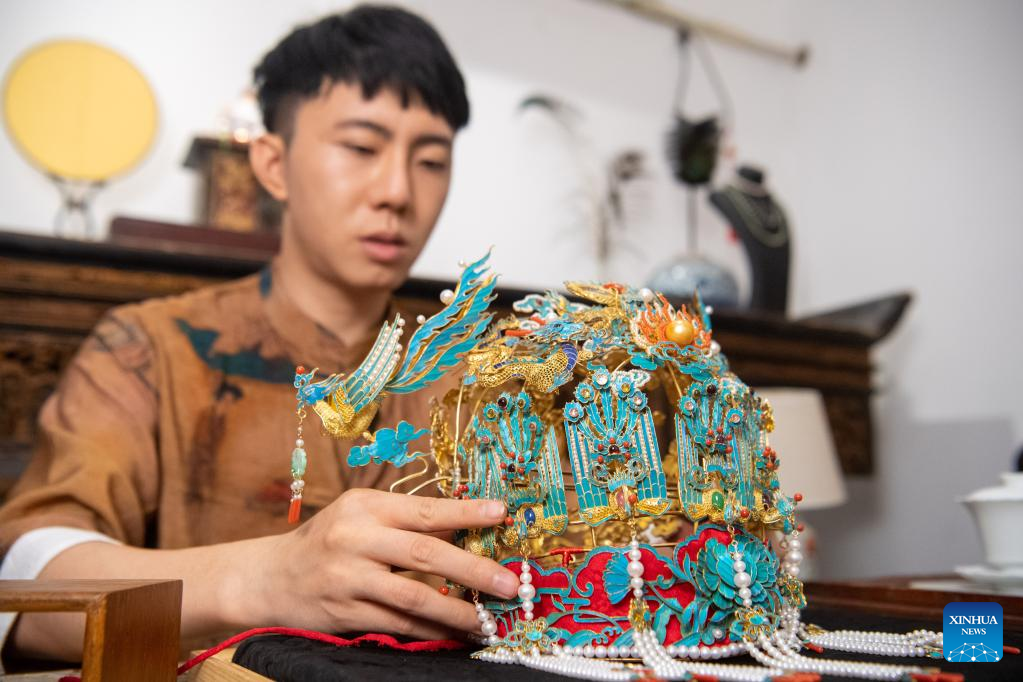
Gu Guoqiang shows a filigree mosaic artwork in southwest China's Chongqing, June 9, 2022. Filigree Mosaic craft, a traditional Chinese aulic handicraft dating back to the Spring and Autumn Period (770-476BC), uses metal such as gold and silver to fold artwork inlaid with gemstone or pearl. It is also called fine gold craft as it usually uses spun gold as thin as 0.16 millimeters to form various shapes, and was listed as one of China's national intangible cultural heritages in 2008.
Gu Guoqiang, born in 1994, fell in love with the craft seven years ago during his study in Beijing for restoration of cultural relics. Fascinated by a filigree mosaic work of his master, he returned to his hometown Chongqing and took provincial-level master of arts and crafts Li Changyi as his new master. In 2007, Gu Guoqiang set up his own studio, exploring a way to make filigree mosaic accessories fitting for modern people. He tries to absorb traditional Chinese culture concepts in his designs, and also takes into account modern taste and use habits.
In order to promote the craft, he shares his works through various platforms and is now followed by 300,000 fans on the popular smartphone app Kuaishou. Some followers even come to Chongqing to learn this craft from him.
Nowadays, Gu's studio sells about 300 filigree mosaic artworks per month, many of which are ordered by people overseas. "Most people try to catch other's eyes by intricate works, however some take craftsmanship as life art," said Gu Guoqiang. He makes his own way in inheriting the ancient art, which is common now in China as more youngsters who love traditional culture and arts are willing to pass down the intangible cultural heritages and create a new future for them. (Xinhua/Tang Yi)
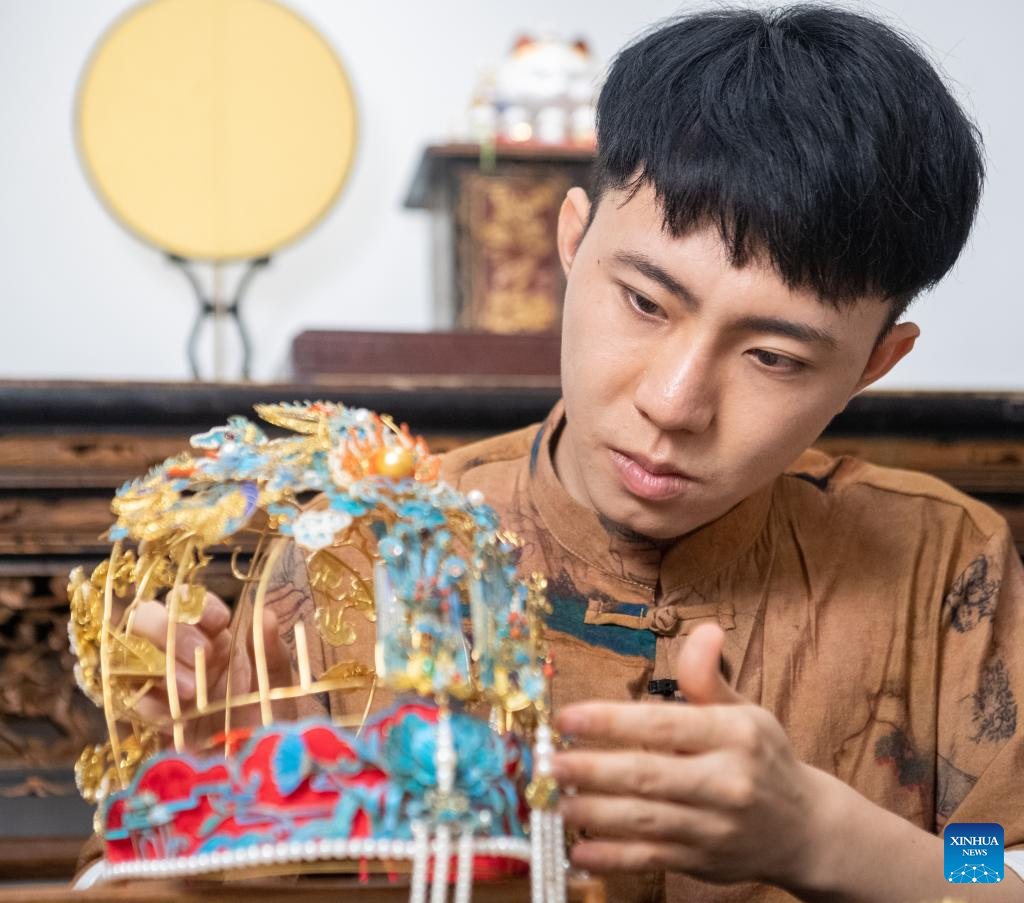
Gu Guoqiang makes a filigree mosaic artwork in southwest China's Chongqing, June 9, 2022. Filigree Mosaic craft, a traditional Chinese aulic handicraft dating back to the Spring and Autumn Period (770-476BC), uses metal such as gold and silver to fold artwork inlaid with gemstone or pearl. It is also called fine gold craft as it usually uses spun gold as thin as 0.16 millimeters to form various shapes, and was listed as one of China's national intangible cultural heritages in 2008.
Gu Guoqiang, born in 1994, fell in love with the craft seven years ago during his study in Beijing for restoration of cultural relics. Fascinated by a filigree mosaic work of his master, he returned to his hometown Chongqing and took provincial-level master of arts and crafts Li Changyi as his new master. In 2007, Gu Guoqiang set up his own studio, exploring a way to make filigree mosaic accessories fitting for modern people. He tries to absorb traditional Chinese culture concepts in his designs, and also takes into account modern taste and use habits.
In order to promote the craft, he shares his works through various platforms and is now followed by 300,000 fans on the popular smartphone app Kuaishou. Some followers even come to Chongqing to learn this craft from him.
Nowadays, Gu's studio sells about 300 filigree mosaic artworks per month, many of which are ordered by people overseas. "Most people try to catch other's eyes by intricate works, however some take craftsmanship as life art," said Gu Guoqiang. He makes his own way in inheriting the ancient art, which is common now in China as more youngsters who love traditional culture and arts are willing to pass down the intangible cultural heritages and create a new future for them. (Xinhua/Tang Yi)
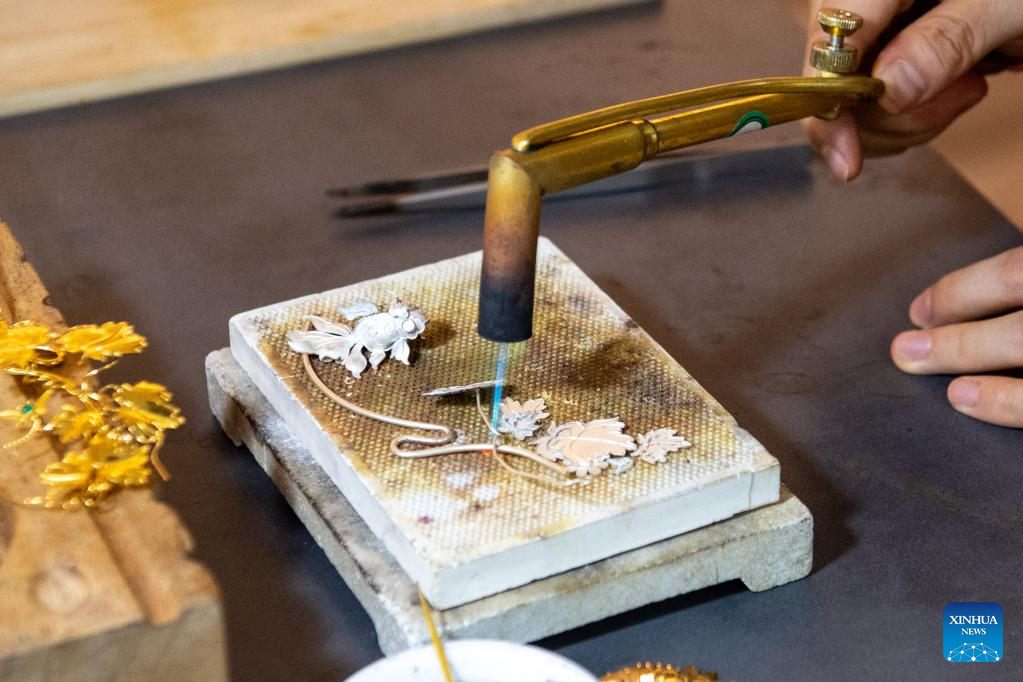
Gu Guoqiang makes a filigree mosaic artwork in southwest China's Chongqing, June 9, 2022. Filigree Mosaic craft, a traditional Chinese aulic handicraft dating back to the Spring and Autumn Period (770-476BC), uses metal such as gold and silver to fold artwork inlaid with gemstone or pearl. It is also called fine gold craft as it usually uses spun gold as thin as 0.16 millimeters to form various shapes, and was listed as one of China's national intangible cultural heritages in 2008.
Gu Guoqiang, born in 1994, fell in love with the craft seven years ago during his study in Beijing for restoration of cultural relics. Fascinated by a filigree mosaic work of his master, he returned to his hometown Chongqing and took provincial-level master of arts and crafts Li Changyi as his new master. In 2007, Gu Guoqiang set up his own studio, exploring a way to make filigree mosaic accessories fitting for modern people. He tries to absorb traditional Chinese culture concepts in his designs, and also takes into account modern taste and use habits.
In order to promote the craft, he shares his works through various platforms and is now followed by 300,000 fans on the popular smartphone app Kuaishou. Some followers even come to Chongqing to learn this craft from him.
Nowadays, Gu's studio sells about 300 filigree mosaic artworks per month, many of which are ordered by people overseas. "Most people try to catch other's eyes by intricate works, however some take craftsmanship as life art," said Gu Guoqiang. He makes his own way in inheriting the ancient art, which is common now in China as more youngsters who love traditional culture and arts are willing to pass down the intangible cultural heritages and create a new future for them. (Xinhua/Tang Yi)
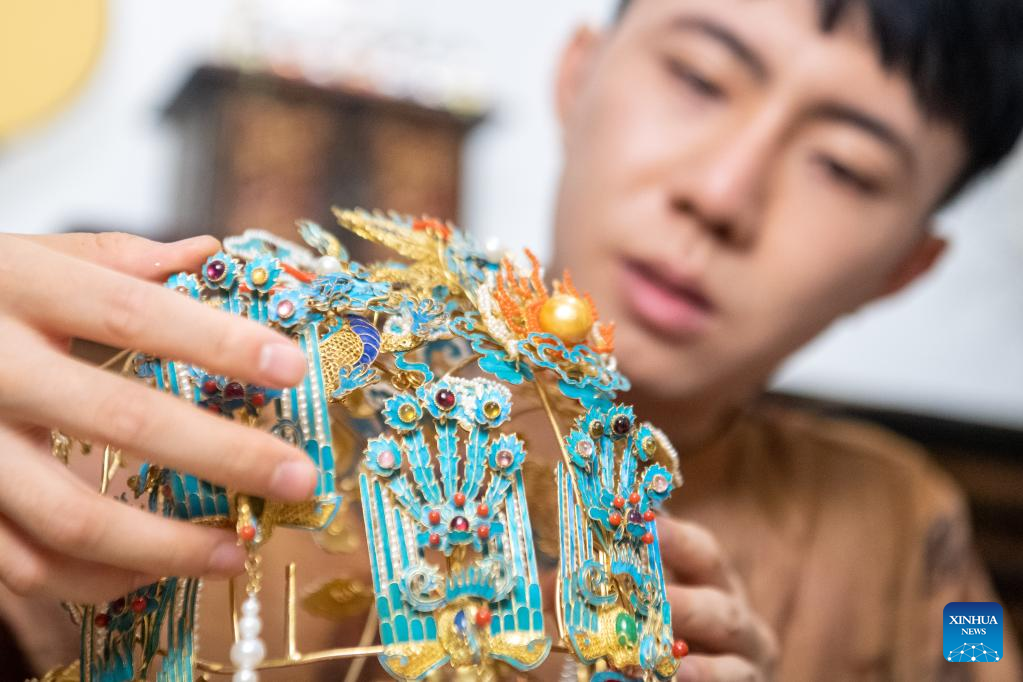
Gu Guoqiang makes a filigree mosaic artwork in southwest China's Chongqing, June 9, 2022. Filigree Mosaic craft, a traditional Chinese aulic handicraft dating back to the Spring and Autumn Period (770-476BC), uses metal such as gold and silver to fold artwork inlaid with gemstone or pearl. It is also called fine gold craft as it usually uses spun gold as thin as 0.16 millimeters to form various shapes, and was listed as one of China's national intangible cultural heritages in 2008.
Gu Guoqiang, born in 1994, fell in love with the craft seven years ago during his study in Beijing for restoration of cultural relics. Fascinated by a filigree mosaic work of his master, he returned to his hometown Chongqing and took provincial-level master of arts and crafts Li Changyi as his new master. In 2007, Gu Guoqiang set up his own studio, exploring a way to make filigree mosaic accessories fitting for modern people. He tries to absorb traditional Chinese culture concepts in his designs, and also takes into account modern taste and use habits.
In order to promote the craft, he shares his works through various platforms and is now followed by 300,000 fans on the popular smartphone app Kuaishou. Some followers even come to Chongqing to learn this craft from him.
Nowadays, Gu's studio sells about 300 filigree mosaic artworks per month, many of which are ordered by people overseas. "Most people try to catch other's eyes by intricate works, however some take craftsmanship as life art," said Gu Guoqiang. He makes his own way in inheriting the ancient art, which is common now in China as more youngsters who love traditional culture and arts are willing to pass down the intangible cultural heritages and create a new future for them. (Xinhua/Tang Yi)
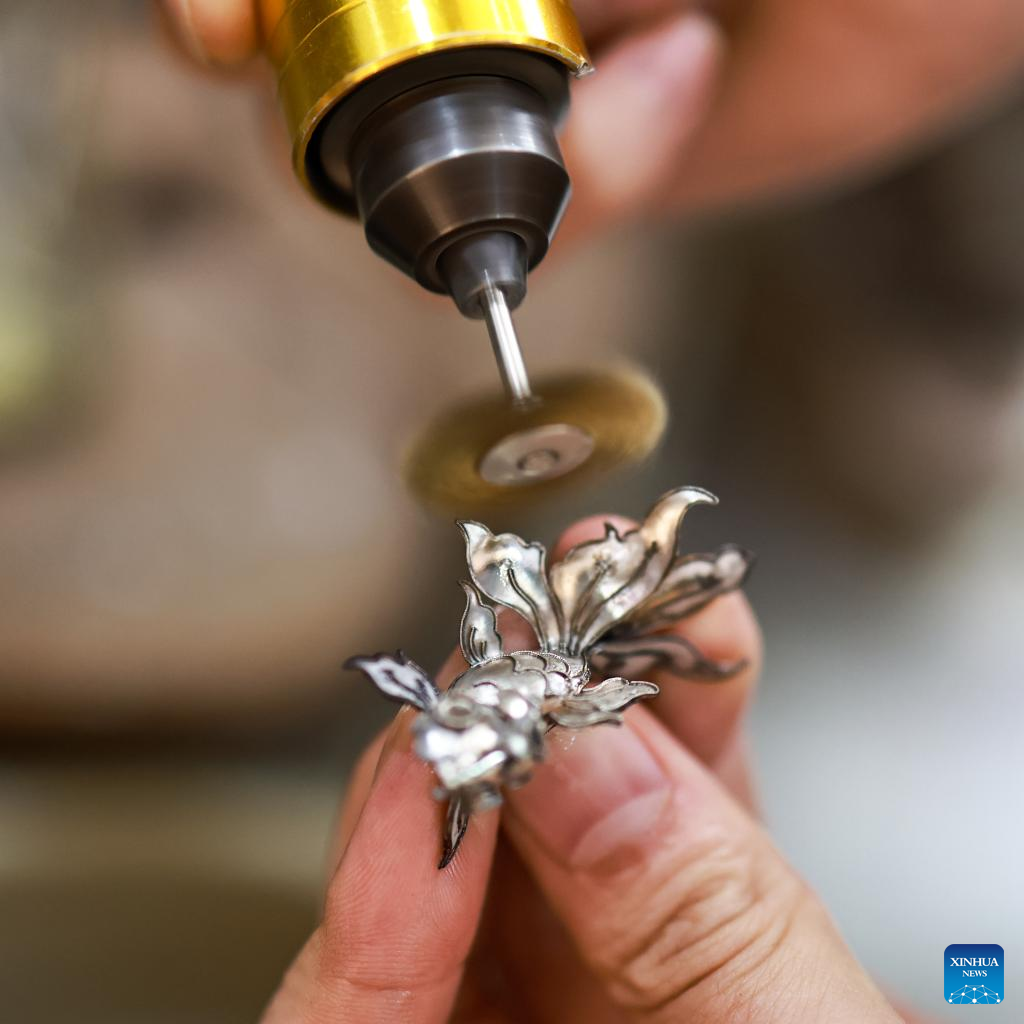
Gu Guoqiang makes a filigree mosaic artwork in southwest China's Chongqing, April 20, 2022. Filigree Mosaic craft, a traditional Chinese aulic handicraft dating back to the Spring and Autumn Period (770-476BC), uses metal such as gold and silver to fold artwork inlaid with gemstone or pearl. It is also called fine gold craft as it usually uses spun gold as thin as 0.16 millimeters to form various shapes, and was listed as one of China's national intangible cultural heritages in 2008.
Gu Guoqiang, born in 1994, fell in love with the craft seven years ago during his study in Beijing for restoration of cultural relics. Fascinated by a filigree mosaic work of his master, he returned to his hometown Chongqing and took provincial-level master of arts and crafts Li Changyi as his new master. In 2007, Gu Guoqiang set up his own studio, exploring a way to make filigree mosaic accessories fitting for modern people. He tries to absorb traditional Chinese culture concepts in his designs, and also takes into account modern taste and use habits.
In order to promote the craft, he shares his works through various platforms and is now followed by 300,000 fans on the popular smartphone app Kuaishou. Some followers even come to Chongqing to learn this craft from him.
Nowadays, Gu's studio sells about 300 filigree mosaic artworks per month, many of which are ordered by people overseas. "Most people try to catch other's eyes by intricate works, however some take craftsmanship as life art," said Gu Guoqiang. He makes his own way in inheriting the ancient art, which is common now in China as more youngsters who love traditional culture and arts are willing to pass down the intangible cultural heritages and create a new future for them. (Photo by Su Zhigang/Xinhua)
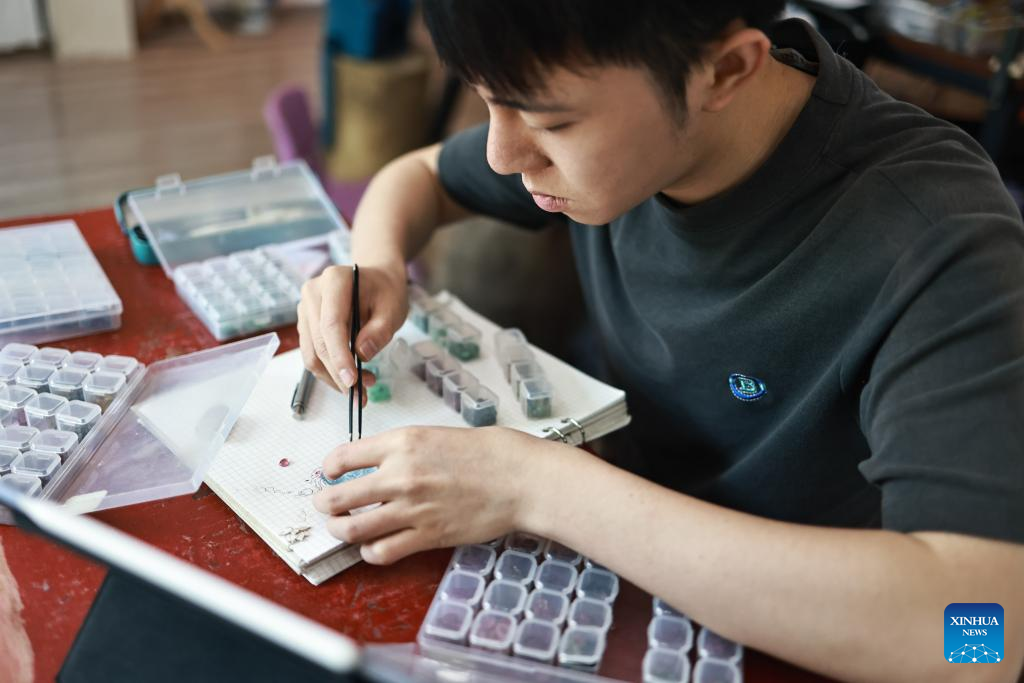
Gu Guoqiang makes a filigree mosaic artwork in southwest China's Chongqing, April 20, 2022. Filigree Mosaic craft, a traditional Chinese aulic handicraft dating back to the Spring and Autumn Period (770-476BC), uses metal such as gold and silver to fold artwork inlaid with gemstone or pearl. It is also called fine gold craft as it usually uses spun gold as thin as 0.16 millimeters to form various shapes, and was listed as one of China's national intangible cultural heritages in 2008.
Gu Guoqiang, born in 1994, fell in love with the craft seven years ago during his study in Beijing for restoration of cultural relics. Fascinated by a filigree mosaic work of his master, he returned to his hometown Chongqing and took provincial-level master of arts and crafts Li Changyi as his new master. In 2007, Gu Guoqiang set up his own studio, exploring a way to make filigree mosaic accessories fitting for modern people. He tries to absorb traditional Chinese culture concepts in his designs, and also takes into account modern taste and use habits.
In order to promote the craft, he shares his works through various platforms and is now followed by 300,000 fans on the popular smartphone app Kuaishou. Some followers even come to Chongqing to learn this craft from him.
Nowadays, Gu's studio sells about 300 filigree mosaic artworks per month, many of which are ordered by people overseas. "Most people try to catch other's eyes by intricate works, however some take craftsmanship as life art," said Gu Guoqiang. He makes his own way in inheriting the ancient art, which is common now in China as more youngsters who love traditional culture and arts are willing to pass down the intangible cultural heritages and create a new future for them. (Photo by Su Zhigang/Xinhua)
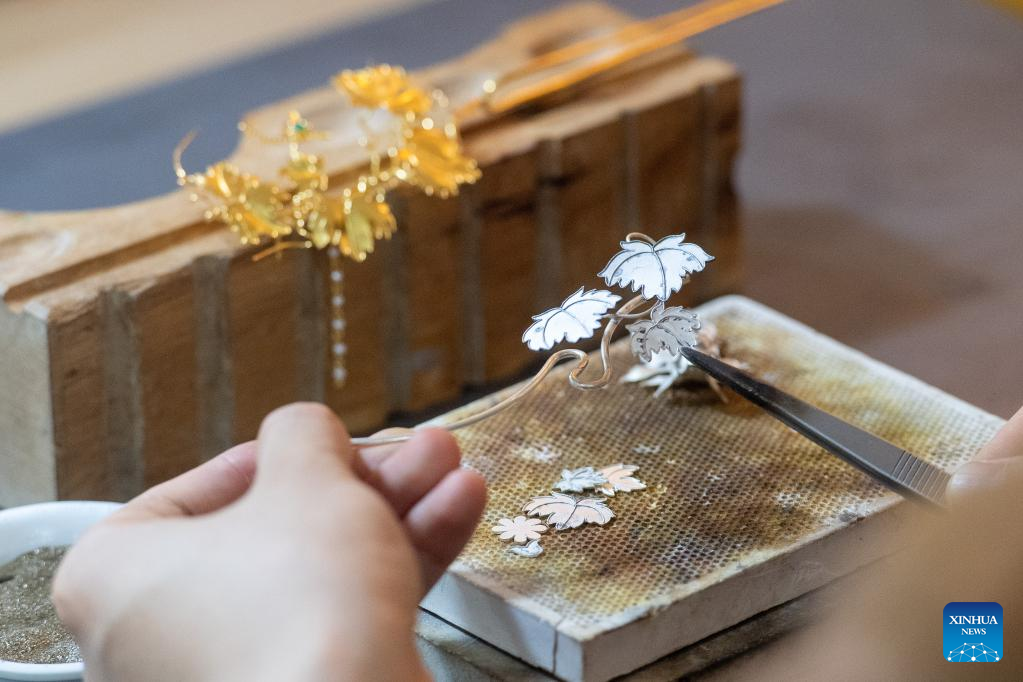
Gu Guoqiang makes a filigree mosaic artwork in southwest China's Chongqing, June 9, 2022. Filigree Mosaic craft, a traditional Chinese aulic handicraft dating back to the Spring and Autumn Period (770-476BC), uses metal such as gold and silver to fold artwork inlaid with gemstone or pearl. It is also called fine gold craft as it usually uses spun gold as thin as 0.16 millimeters to form various shapes, and was listed as one of China's national intangible cultural heritages in 2008.
Gu Guoqiang, born in 1994, fell in love with the craft seven years ago during his study in Beijing for restoration of cultural relics. Fascinated by a filigree mosaic work of his master, he returned to his hometown Chongqing and took provincial-level master of arts and crafts Li Changyi as his new master. In 2007, Gu Guoqiang set up his own studio, exploring a way to make filigree mosaic accessories fitting for modern people. He tries to absorb traditional Chinese culture concepts in his designs, and also takes into account modern taste and use habits.
In order to promote the craft, he shares his works through various platforms and is now followed by 300,000 fans on the popular smartphone app Kuaishou. Some followers even come to Chongqing to learn this craft from him.
Nowadays, Gu's studio sells about 300 filigree mosaic artworks per month, many of which are ordered by people overseas. "Most people try to catch other's eyes by intricate works, however some take craftsmanship as life art," said Gu Guoqiang. He makes his own way in inheriting the ancient art, which is common now in China as more youngsters who love traditional culture and arts are willing to pass down the intangible cultural heritages and create a new future for them. (Xinhua/Tang Yi)
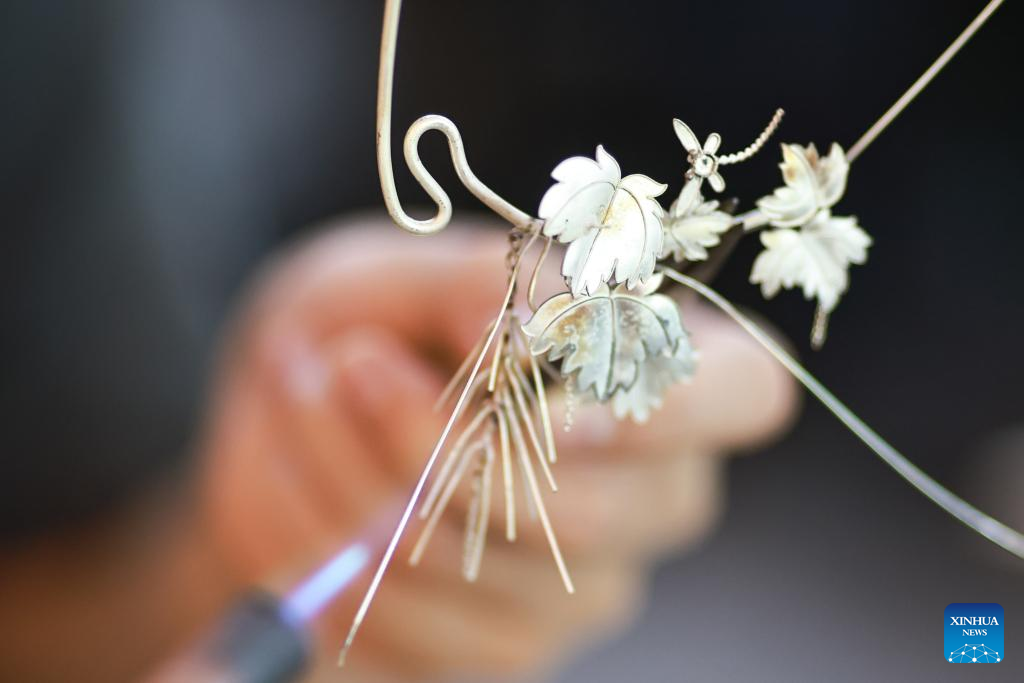
Gu Guoqiang makes a filigree mosaic artwork in southwest China's Chongqing, April 20, 2022. Filigree Mosaic craft, a traditional Chinese aulic handicraft dating back to the Spring and Autumn Period (770-476BC), uses metal such as gold and silver to fold artwork inlaid with gemstone or pearl. It is also called fine gold craft as it usually uses spun gold as thin as 0.16 millimeters to form various shapes, and was listed as one of China's national intangible cultural heritages in 2008.
Gu Guoqiang, born in 1994, fell in love with the craft seven years ago during his study in Beijing for restoration of cultural relics. Fascinated by a filigree mosaic work of his master, he returned to his hometown Chongqing and took provincial-level master of arts and crafts Li Changyi as his new master. In 2007, Gu Guoqiang set up his own studio, exploring a way to make filigree mosaic accessories fitting for modern people. He tries to absorb traditional Chinese culture concepts in his designs, and also takes into account modern taste and use habits.
In order to promote the craft, he shares his works through various platforms and is now followed by 300,000 fans on the popular smartphone app Kuaishou. Some followers even come to Chongqing to learn this craft from him.
Nowadays, Gu's studio sells about 300 filigree mosaic artworks per month, many of which are ordered by people overseas. "Most people try to catch other's eyes by intricate works, however some take craftsmanship as life art," said Gu Guoqiang. He makes his own way in inheriting the ancient art, which is common now in China as more youngsters who love traditional culture and arts are willing to pass down the intangible cultural heritages and create a new future for them. (Photo by Su Zhigang/Xinhua)
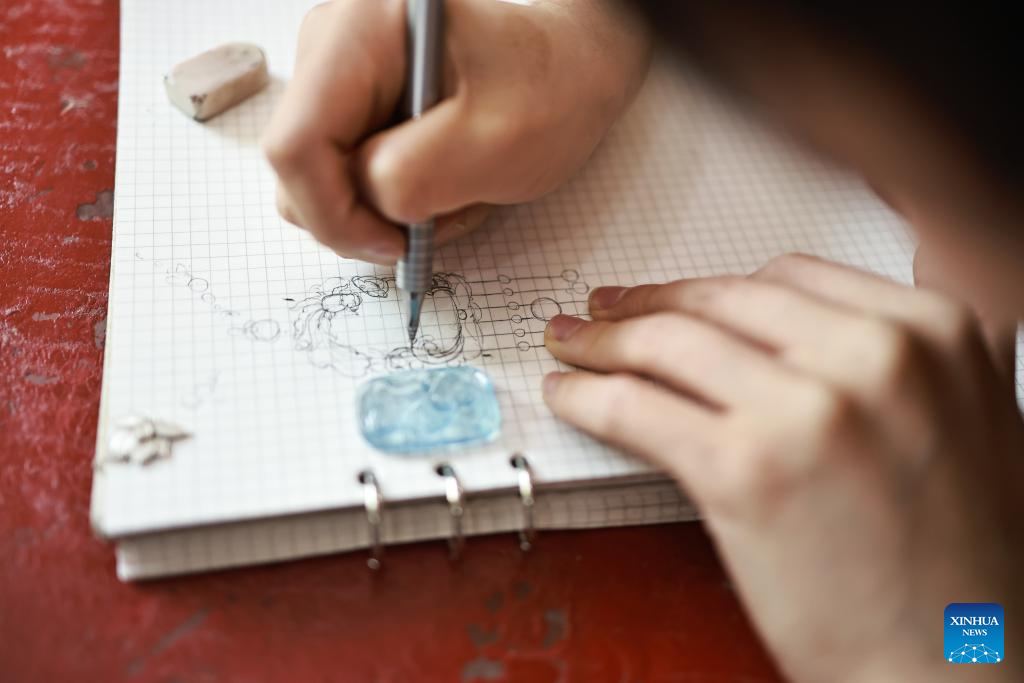
Gu Guoqiang sketches a filigree mosaic artwork in southwest China's Chongqing, April 20, 2022. Filigree Mosaic craft, a traditional Chinese aulic handicraft dating back to the Spring and Autumn Period (770-476BC), uses metal such as gold and silver to fold artwork inlaid with gemstone or pearl. It is also called fine gold craft as it usually uses spun gold as thin as 0.16 millimeters to form various shapes, and was listed as one of China's national intangible cultural heritages in 2008.
Gu Guoqiang, born in 1994, fell in love with the craft seven years ago during his study in Beijing for restoration of cultural relics. Fascinated by a filigree mosaic work of his master, he returned to his hometown Chongqing and took provincial-level master of arts and crafts Li Changyi as his new master. In 2007, Gu Guoqiang set up his own studio, exploring a way to make filigree mosaic accessories fitting for modern people. He tries to absorb traditional Chinese culture concepts in his designs, and also takes into account modern taste and use habits.
In order to promote the craft, he shares his works through various platforms and is now followed by 300,000 fans on the popular smartphone app Kuaishou. Some followers even come to Chongqing to learn this craft from him.
Nowadays, Gu's studio sells about 300 filigree mosaic artworks per month, many of which are ordered by people overseas. "Most people try to catch other's eyes by intricate works, however some take craftsmanship as life art," said Gu Guoqiang. He makes his own way in inheriting the ancient art, which is common now in China as more youngsters who love traditional culture and arts are willing to pass down the intangible cultural heritages and create a new future for them. (Photo by Su Zhigang/Xinhua)
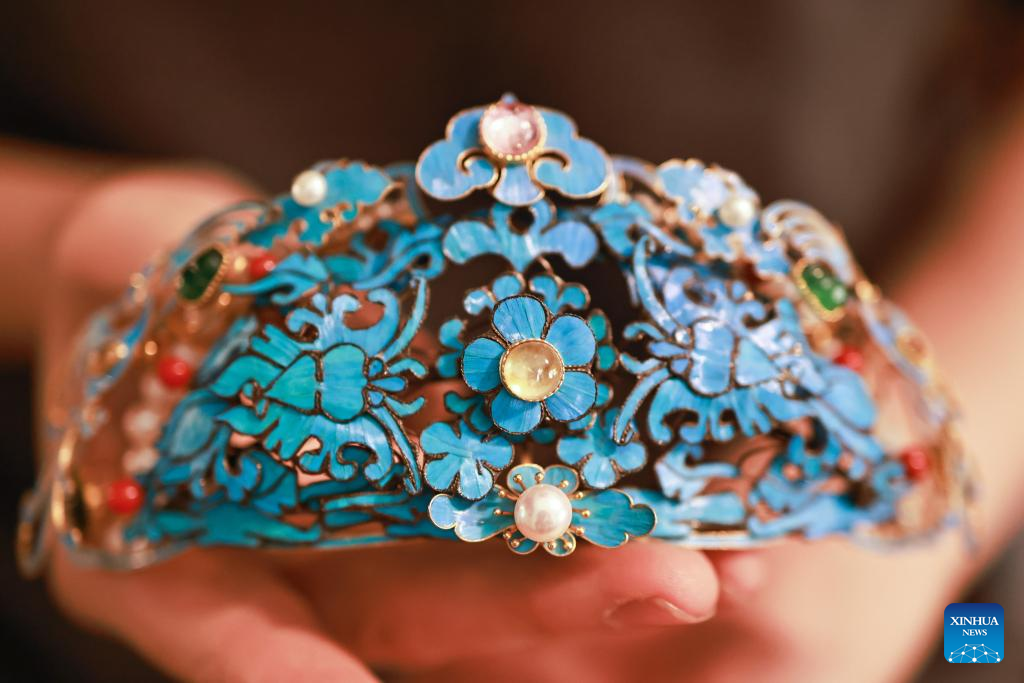
Gu Guoqiang shows a filigree mosaic artwork in southwest China's Chongqing, April 20, 2022. Filigree Mosaic craft, a traditional Chinese aulic handicraft dating back to the Spring and Autumn Period (770-476BC), uses metal such as gold and silver to fold artwork inlaid with gemstone or pearl. It is also called fine gold craft as it usually uses spun gold as thin as 0.16 millimeters to form various shapes, and was listed as one of China's national intangible cultural heritages in 2008.
Gu Guoqiang, born in 1994, fell in love with the craft seven years ago during his study in Beijing for restoration of cultural relics. Fascinated by a filigree mosaic work of his master, he returned to his hometown Chongqing and took provincial-level master of arts and crafts Li Changyi as his new master. In 2007, Gu Guoqiang set up his own studio, exploring a way to make filigree mosaic accessories fitting for modern people. He tries to absorb traditional Chinese culture concepts in his designs, and also takes into account modern taste and use habits.
In order to promote the craft, he shares his works through various platforms and is now followed by 300,000 fans on the popular smartphone app Kuaishou. Some followers even come to Chongqing to learn this craft from him.
Nowadays, Gu's studio sells about 300 filigree mosaic artworks per month, many of which are ordered by people overseas. "Most people try to catch other's eyes by intricate works, however some take craftsmanship as life art," said Gu Guoqiang. He makes his own way in inheriting the ancient art, which is common now in China as more youngsters who love traditional culture and arts are willing to pass down the intangible cultural heritages and create a new future for them. (Photo by Su Zhigang/Xinhua)
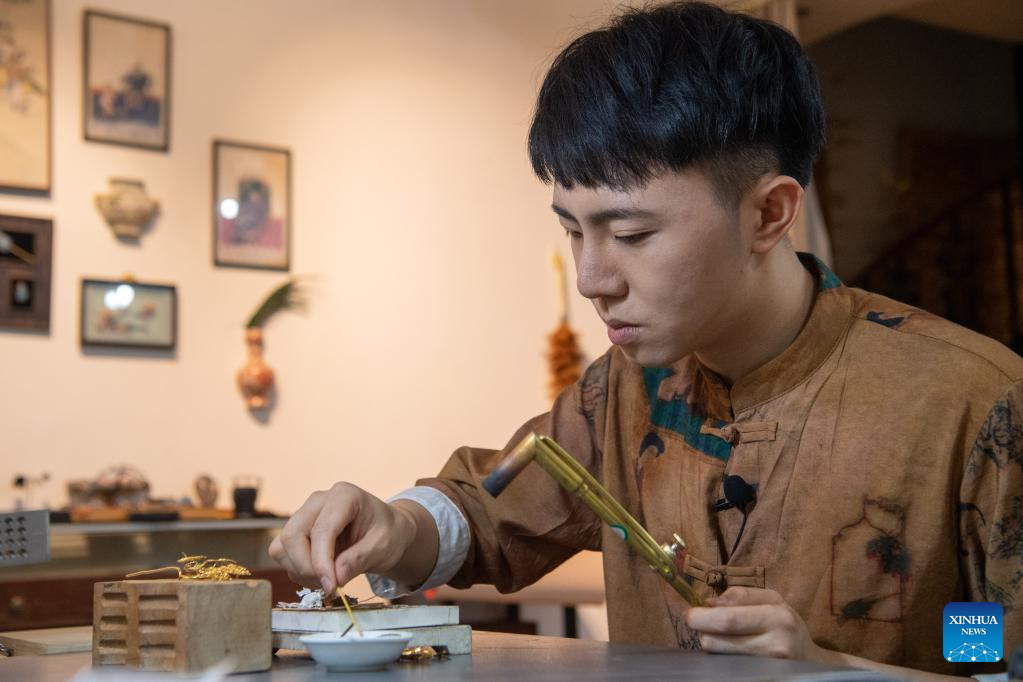
Gu Guoqiang makes a filigree mosaic artwork in southwest China's Chongqing, June 9, 2022. Filigree Mosaic craft, a traditional Chinese aulic handicraft dating back to the Spring and Autumn Period (770-476BC), uses metal such as gold and silver to fold artwork inlaid with gemstone or pearl. It is also called fine gold craft as it usually uses spun gold as thin as 0.16 millimeters to form various shapes, and was listed as one of China's national intangible cultural heritages in 2008.
Gu Guoqiang, born in 1994, fell in love with the craft seven years ago during his study in Beijing for restoration of cultural relics. Fascinated by a filigree mosaic work of his master, he returned to his hometown Chongqing and took provincial-level master of arts and crafts Li Changyi as his new master. In 2007, Gu Guoqiang set up his own studio, exploring a way to make filigree mosaic accessories fitting for modern people. He tries to absorb traditional Chinese culture concepts in his designs, and also takes into account modern taste and use habits.
In order to promote the craft, he shares his works through various platforms and is now followed by 300,000 fans on the popular smartphone app Kuaishou. Some followers even come to Chongqing to learn this craft from him.
Nowadays, Gu's studio sells about 300 filigree mosaic artworks per month, many of which are ordered by people overseas. "Most people try to catch other's eyes by intricate works, however some take craftsmanship as life art," said Gu Guoqiang. He makes his own way in inheriting the ancient art, which is common now in China as more youngsters who love traditional culture and arts are willing to pass down the intangible cultural heritages and create a new future for them. (Xinhua/Tang Yi)
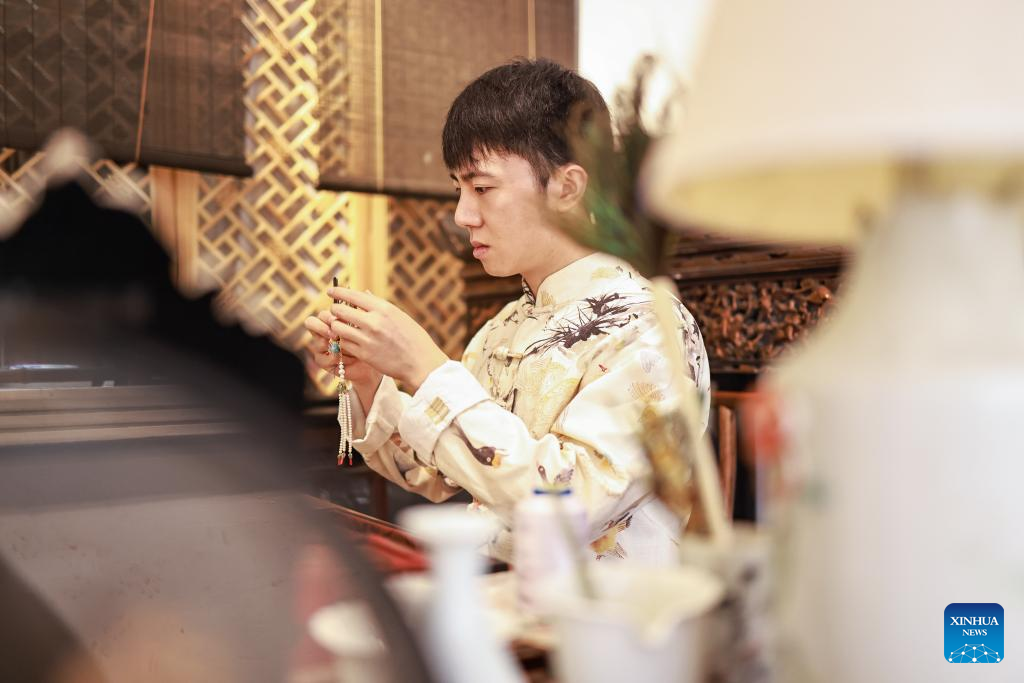
Gu Guoqiang makes a filigree mosaic artwork in southwest China's Chongqing, April 20, 2022. Filigree Mosaic craft, a traditional Chinese aulic handicraft dating back to the Spring and Autumn Period (770-476BC), uses metal such as gold and silver to fold artwork inlaid with gemstone or pearl. It is also called fine gold craft as it usually uses spun gold as thin as 0.16 millimeters to form various shapes, and was listed as one of China's national intangible cultural heritages in 2008.
Gu Guoqiang, born in 1994, fell in love with the craft seven years ago during his study in Beijing for restoration of cultural relics. Fascinated by a filigree mosaic work of his master, he returned to his hometown Chongqing and took provincial-level master of arts and crafts Li Changyi as his new master. In 2007, Gu Guoqiang set up his own studio, exploring a way to make filigree mosaic accessories fitting for modern people. He tries to absorb traditional Chinese culture concepts in his designs, and also takes into account modern taste and use habits.
In order to promote the craft, he shares his works through various platforms and is now followed by 300,000 fans on the popular smartphone app Kuaishou. Some followers even come to Chongqing to learn this craft from him.
Nowadays, Gu's studio sells about 300 filigree mosaic artworks per month, many of which are ordered by people overseas. "Most people try to catch other's eyes by intricate works, however some take craftsmanship as life art," said Gu Guoqiang. He makes his own way in inheriting the ancient art, which is common now in China as more youngsters who love traditional culture and arts are willing to pass down the intangible cultural heritages and create a new future for them. (Photo by Su Zhigang/Xinhua)


